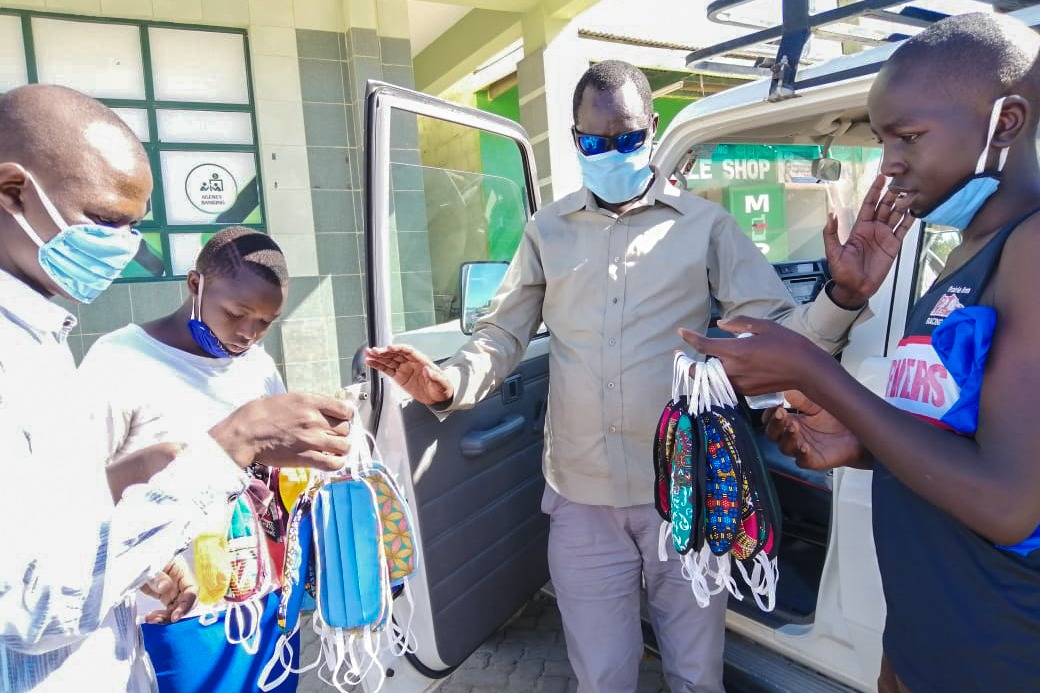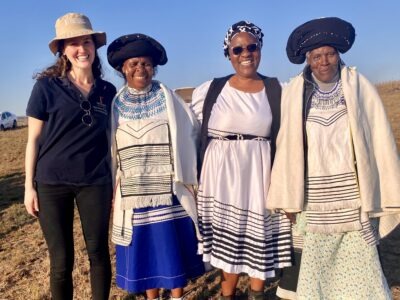
Picture Northern Kenya’s Turkana County and arid lands and people struggling with hunger may come to mind. For decades, residents of Turkana County who depend on livestock to earn a living have suffered shocks such as droughts, floods, and locust infestations that lead to extreme poverty and a need for food relief. Building the resilience of these residents will require a shift in how the community, its leaders, and institutions operate. One path to building that resilience is leveling the playing field to strengthen the country’s weak private sector.
A level playing field is when two groups have an equal chance of succeeding in a given situation. In the private sector, the playing field consists of skills, capital, environments, and business models — in other words, these are the elements that the Turkana County Chamber of Commerce aims to improve.
As a branch of the Kenya National Chamber of Commerce and Industry (KNCCI), the chamber exists to advocate for a sustainable business environment and economic growth in Turkana County. Its mandate includes promoting the commercial and industrial interest of its members, facilitating trade and finance, sharing statistical information with its members, and arbitrating disputes. This is carried out through committees, which span agribusiness, finance, mining, natural resources, small- and medium-sized enterprises (SMEs), and more.
Since its establishment in Turkana County in 2004, the chamber has experienced a dramatic change. It grew from just 71 members in 2018 to 1,600 members today. This spike in membership can be traced back to late 2019, when a newly elected board of directors reinvigorated the chamber and, for the first time, represented all six sub-counties in Turkana equally.
Before this jolt of energy, the chamber had been dormant for more than a decade. Because of its sleepy beginnings, the chamber’s incoming office bearers inherited few plans for how to achieve their mandate. They lacked not only a strategic plan but also leadership positions within the county and reliable data to help them lobby for private sector involvement. They also had low membership rates and little physical presence across the county for supporting traders.
The Feed the Future Kenya Livestock Market Systems (LMS) Activity, funded by USAID and implemented by ACDI/VOCA and its partners Mercy Corps, Smart Regional Consultants, and The BOMA Project, helped the Turkana County Chamber of Commerce find direction in several ways.
Building the Chamber’s Internal Capacity
The LMS Activity trained 40 board and committee members, with the chamber contributing KES 121,000 toward these efforts, on how to lobby for key positions within leadership bodies and management boards throughout the county, including the County Emergency Response Committee.
Using these newfound skills, the board successfully lobbied to reopen the cross-border livestock market in Loya as well as the non-closure of the Kakuma, Lodwar, and other livestock markets negatively affected by the COVID-19 pandemic. Training also supported the chamber in developing its strategic plan.
“Our journey toward the realization of this plan is a collective effort of members, board, and committee members. The strategic plan provides for the voice of the business community and resources mobilization, resulting in sustainability and increased impact on areas of intervention.”
–Pius Ewoton, CHAIRPERSON
The plan enabled the chamber to recruit hundreds of new members who contributed roughly KES 600,000 in revenue. That revenue allowed for offices in Kakuma and Kalokol to open and better serve the chamber’s members.
Assessing COVID-19’s Impact on Businesses
To help businesses withstand COVID-19, the Turkana County Chamber of Commerce first needed to understand the challenges they faced. With KES 45,600 in support from the chamber, the LMS Activity conducted rapid assessments of businesses. These assessments provided reliable information on the current status of local traders and their needs.
Based on the evidence gathered, the chamber lobbied for financial assistance, securing the opportunity to benefit from the KES 200 billion Equity Bank-KNCCI loans deal and KES 700 million interest-free loans from the Mastercard Foundation in partnership with KNCCI. Other financial assistance included a proposed KES 35 million in business grants, including KES 25 million for business funding, from the Kenya National Highway Authority.
The loans will provide working capital to traders whose livelihoods were disrupted by the pandemic due to restrictions, closures, or an inability to reach end markets. With working capital, they will be able to buy more from producers and stimulate economic activity within a stressed supply chain. The LMS Activity provided technical assistance, such as training on leadership, governance, strategic planning, and lobbying skills, to support fundraising efforts for cooperative groups and traders within livestock market associations that are chamber members. Through this financial assistance, the chamber will mobilize traders, including those working in remote areas where few financial services were available. It will also boost opportunities for SMEs that previously struggled to access capital. The funds are projected to be released within the next three months to qualifying chamber members.
Supporting Safe Business Operations
The LMS Activity aided the Turkana County Chamber of Commerce in visiting 27 livestock markets in six sub-counties to spread awareness of the Ministry of Health’s COVID-19 guidelines among livestock, fish, and other traders. The chamber also distributed 350 face masks and 100 containers of hand sanitizer to ensure that traders could adhere to the guidelines, thus preventing future closures and facilitating the reopening of closed markets. As a result, traders were able to continue trading, earning an income, and preventing hunger and malnutrition within their households.
Strengthening Business and Financial Literacy Skills
To prepare traders for the loans, the LMS Activity supported 900 traders who took part in training offered by Equity Bank. They learned about budgeting and separating needs from wants, saving to cushion themselves from unexpected shocks, bank services, and insurance and debt management. They also developed new skills in marketing, costing, business planning, diversification, digitization, stock control, cash flow management, and crisis management.
“I now know that I don’t have to wait for markets to open for me to take my goods to the market to sell during this COVID period. I take advantage of my phone to look for customers, receive payments, and make deliveries. I also know that I need to save some money to cushion me against uncertainties.”
—Jessica Nangiti, training participant
Maintaining the Momentum of Change
To date, 18 SMEs have each received KES 30,000 in interest-free loans from the Mastercard Foundation thanks to the Turkana County Chamber of Commerce’s support, illustrating just how critical the chamber is in addressing the bottlenecks they face. The LMS Activity supports the strides made by the chamber as it continues to help local traders access the financing they need to thrive.
This post was written by the Feed the Future Kenya Livestock Market Systems Activity’s Venny Mayaka, agribusiness investment director, and Humphrey Dianga, Turkana County program manager, with input from Paul Newall, associate director of Partnerships & Investments at ACDI/VOCA.
Learn more about the Feed the Future Kenya Livestock Market Systems Activity here.
Learn more about our work in Kenya here.





